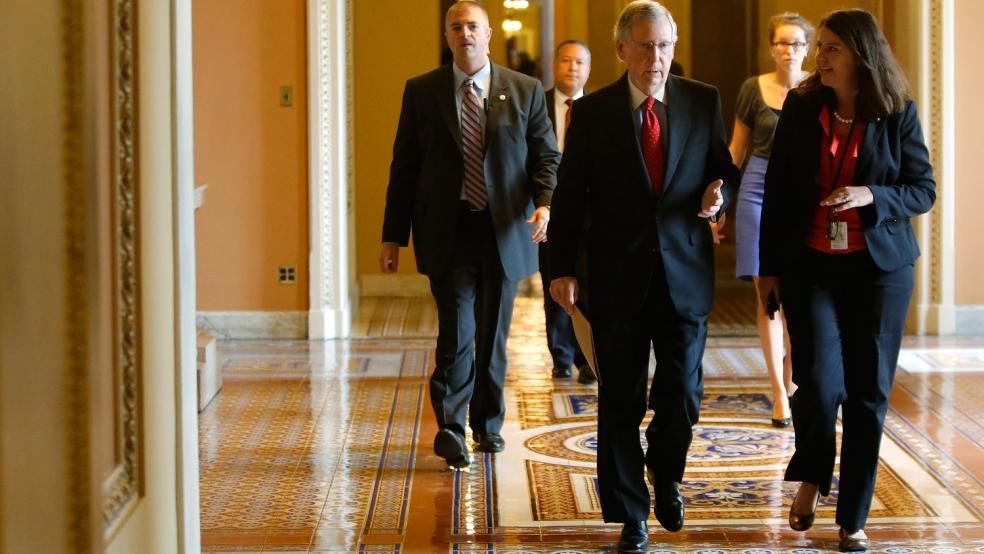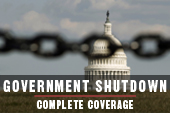The 16-day government shutdown and looming threat of a first-ever default on U.S. debt ended Wednesday evening as the Democratic-controlled Senate and Republican-controlled House approved a bipartisan deal to reopen the government through mid-January and raise the debt ceiling through Feb.7.
The votes came after House GOP leaders finally abandoned a prolonged attempt to use the shutdown as leverage to postpone implementation of President Obama’s signature health care law.
RELATED: SHUTDOWN SHOCKER: S&P SAYS ECONOMY LOST $24 BILLION
Government agencies that were forced to furlough hundreds of thousands of workers and contractors and shutter national parks and monuments were expected to begin recalling employees almost immediately. The crisis, which began in the wee hours of the morning of Oct. 1., was the first extended government shutdown since the “Republican Revolution” of the mid-1990s during the Clinton administration.
The Office of Management and Budget (OMB) estimated that the two government shutdowns in late 1995 and early 1996, totaling 27 days, cost the federal government $1.4 billion. That's the equivalent of over $2 billion in today's dollars, related to costs including back pay to furloughed federal workers and uncollected fines and taxes. This year’s shutdown is certain to cost far more than that.
Analysts at Standard & Poor’s estimate that the shutdown has sucked $24 billion out of the economy, or at least 0.6 percentage points off of annualized fourth quarter GDP growth. If that's not bad enough, the agency also warned that the economic damage might not be over yet.
OBAMA POISED TO SIGN BILL
Even before the House had a chance to act, Obama said at the White House that he would immediately sign the legislation when it reaches his desk.
“We’ll begin reopening our government immediately, and we can begin to lift this cloud of uncertainty and unease from our businesses and from the American people,” Obama said. “There’s a lot of work ahead of us — including our need to earn back the trust of the American people that’s been lost over the last few weeks. And we can begin to do that by addressing the real issues that they care about.”
“I’ve said it before, I’ll say it again,” he added. “I’m willing to work with anybody, I’m eager to work with anybody — Democrat or Republican, House or Senate members – on any idea that will grow our economy, create new jobs, strengthen the middle class and get our fiscal house in order for the long term.”
RELATED: 3 POST-SHUTDOWN WORRIES FOR INVESTORS
Senate Democrats and Republicans eagerly pushed through the bipartisan compromise finally forged earlier in the day by Senate Majority Leader Harry Reid (D-NV) and Minority Leader Mitch McConnell (R-KY), by a vote of 81 to 18. Twenty-seven Republicans joined 52 Democrats and two independents to pass the measure. All 18 "no" votes came from Republicans, while Sen. Jim Inhofe (R-OK) was absent.
Republican senators had been clamoring for days to end the shutdown and avoid a default in the wake of an angry response to the manufactured crisis by business leaders and global financial officials, as well as polls showing that nearly three-fourths of Americans primarily blamed Republicans for the mess. Treasury Secretary Jack Lew warned that the government would begin to default on its obligations as early as Thursday.
The only real suspense in the Senate was whether Sen. Ted Cruz (R-TX), who has helped spearhead conservative opposition to the health-care law and precipitated the government shutdown, would use parliamentary procedures to slow Senate action. Cruz told reporters earlier in the day that while he was disappointed in the results, he would not try to delay a final vote.
Just before the vote, Cruz stood and in a speech tried to shame his GOP colleagues, calling Obamacare the country's "biggest job killer," a claim that has yet to be substantiated with economic data. He blasted his caucus for not standing with the House to gut the 2010 Affordable Care Act.
RELATED: CRUZ FINALLY BLINKS; SENATE DEBT PLAN MOVES AHEAD
“Imagine a world in which Senate Republicans united to support House Republicans," he said. “If that had happened, this result would have been very, very different.”
Cruz never spelled out what that result would have looked like. He implied that Obama and Senate Democrats would have caved, although it's just as possible the country would have been rattled into a recession by a government default.
The Texas senator later tweeted that the "DC establishment" was "selling the people down the river," using a turn of phrase that originally applied to the slave trade.
"I'm hopeful that we can work together in a budget conference to end these constant crises," said Senate Budget Committee Chairwoman Patty Murray (D-WA).
Later in the evening, the House voted 285-144 to approve the deal. That came after House Speaker John Boehner (R-OH) announced earlier in the day he would allow the measure to pass on the House floor after weeks of battling Obama and Senate Democrats over the terms of an agreement and GOP efforts to derail Obamacare.
Boehner released a statement saying that he and his party did everything they could to persue their goals, and that their efforts will continue with the creation of a bicameral, bipartisan committee to work out larger budget issues.
“But blocking the bipartisan agreement reached today by members of the Senate will not be a tactic for us,” Boehner said.
Later, in an interview with radio station WLW-AM in Cincinnati, Boehner said, “We’ve been locked in a fight over here trying to bring government down to size, trying to do our best to stop Obamacare. We fought the good fight. We just didn’t win.”
The bipartisan deal arrived on the Senate floor this evening after Boehner failed to convince his caucus on Tuesday to vote for his slightly more onerous alternative to financing the government through Jan. 15 and raising the debt limit through Feb. 7.
RELATED: TEA PARTY FINALLY TRUSTS BOEHNER
Under the agreement, the government would be funded through Jan. 15, and the debt ceiling would be raised until Feb. 7. A separate motion would instruct House and Senate negotiators to reach accord by Dec. 13 on a blueprint for tax and spending policies over the next decade.
Boehner has tried repeatedly to placate several dozen hard-core conservative Tea Party members who have demanded an assault on Obamacare at any price — even if that meant a continuation of the shutdown or a default by the Treasury that economists and financial experts insisted would prompt a “cataclysmic” worldwide economic downturn and another recession.
Democrats on Tuesday blasted Boehner for trying to “sabotage” the emerging Senate bipartisan deal with one last version of a continuing resolution that contained anti-Obamacare measures. But as the political clouds began to lift this morning and Congress appeared ready to end the two week old shutdown, some Democrats praised the Speaker for doing the right thing in the end.
Rep. Chris Van Hollen of Maryland, the ranking Democrat on the House Budget Committee, told CNN that the fundamental question for weeks has been “is the Speaker going to stand up to the really reckless faction within his party in order to do the right thing for the country.”
“I believe he’s made that decision,” Van Hollen said.
The Fiscal Times' Josh Boak contributed to this piece.





